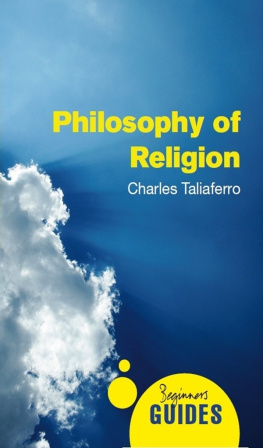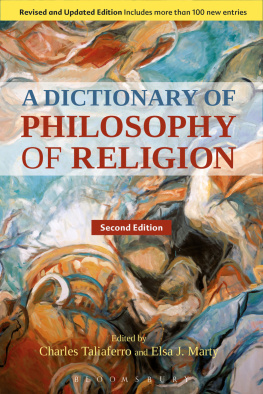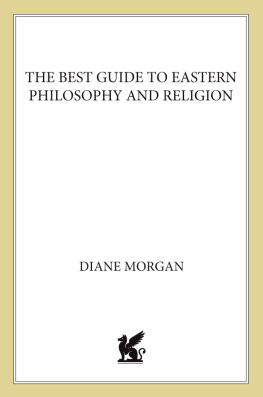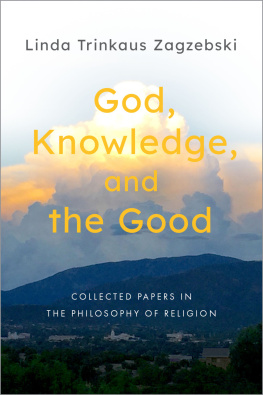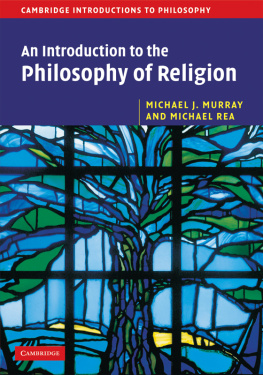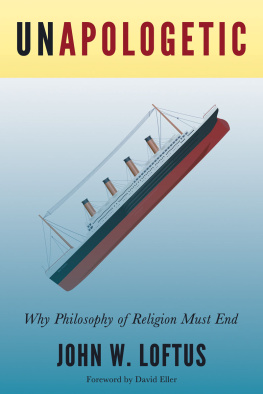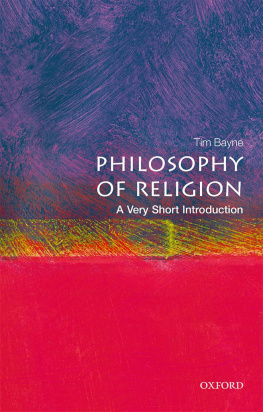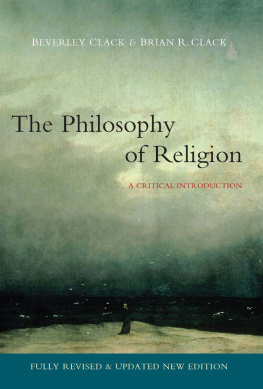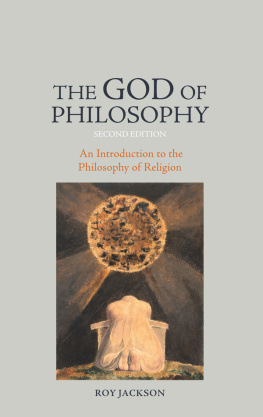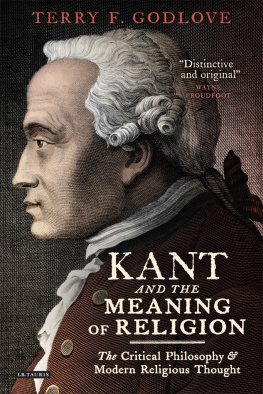Philosophy of Religion
A Beginners Guide
Philosophy
A Beginners Guide

A Oneworld Paperback Original
Published by Oneworld Publications 2009
This ebook edition published by Oneworld Publications 2012
Copyright Charles Taliaferro 2009
The right of Charles Taliaferro to be identified as the Author of this work has been asserted by him in accordance with the Copyright, Designs and Patents Act 1988
All rights reserved
Copyright under Berne Convention
A CIP record for this title is available from the British Library
ISBN 9781851686506
ebook ISBN 9781780741741
Typeset by Jayvee, Trivandrum, India
Cover design by fatfacedesign.co.uk
Oneworld Publications
10 Bloomsbury Street, London, WC1B 3SR, England
Stay up to date with the latest books, special offers, and exclusive content from Oneworld with our monthly newsletter
Sign up on our website
www.oneworld-publications.com
Preface
Is there a God? Is the cosmos created? Is evil compatible with an all-powerful, all-knowing, all-good creator? Can we experience God? How can we tell whether religious experiences are reliable? What is the relationship between religions? How are their different concepts of the sacred and of ultimate reality related? How should we assess the value of religious practices like prayer, meditation, worship, pilgrimages, and the love of God and neighbor? Do they make sense? Could we survive death? What is the relationship between religion and science? Between religion and morality? What should be the relationship between religion and politics?
These are only some of the questions that define the philosophy of religion. Philosophically reflecting on religion is not an abstract theoretical enterprise of interest only to the professional philosopher. It also has clear relevance to contemporary life, requiring philosophical engagement with the beliefs and practices of the majority of the world population. Only 550 million of the worlds 6.7 billion people claim to be non-religious, secular atheists, agnostics, or skeptics. In the 1960s it was thought by some sociologists that world religions would severely atrophy in the coming decades, but quite the reverse has taken place (Berger 1997, 974; Stark 2006).
The philosophy of religion provides an exciting point of contact between different cultures. Its themes bear on both Eastern and Western thought, and the relationship between the Northern and Southern Hemispheres. I have been part of delegations of philosophers from the West to Russia and China which have taken part in sustained, rich exchanges on the subject of philosophy of religion. There, rather than being dismissed as an opiate of the people or as of only marginal historical interest, as it was in Soviet and Maoist days, religious traditions are now taken seriously as sources for contemporary thinking not only about God but about value theory and the philosophy of language and culture. This is a far cry from the first philosophy conference I attended as an undergraduate student: the Fourteenth World Congress of Philosophy held in Bulgaria in 1973, before the collapse of Soviet power. At the philosophy of religion session, a Chinese philosopher gave an enthusiastic report on the Chinese governments success in secularizing Mongolia. Now, Chinese scholars spend time not on thinking about the social engineering of religious doubt or belief, but on investigating the nature and credibility of religion in the context of the democratic culture being fostered on the campuses of the great Chinese universities.
Philosophy of religion is one of the most intellectually exciting areas of philosophy, for it touches on virtually every other area of philosophy, from the philosophy of space and time, of science, to ethics, logic, and epistemology.
Finally, the philosophy of religion speaks directly to the meaning of life. The teachings of the world religions may seem to some to be antiquated and irrelevant, but a moments exploration of religion reveals them to be radically important should one or more of them be true. In the 1970s and 1980s it was fashionable for academic philosophers to dismiss questions about the meaning of life. Life is too fragmented to have a meaning, at least a meaning we can discern. But we persist in asking about the meaning or significance of our life and therefore about the possible role and truth of religion. Buddhism holds that the concept of the self as a substantial, concrete individual enduring over time and a life built on the pursuit of desire is deeply problematic. Christianity (in its traditional form) holds that we are enduring substantial beings (sometimes thought of as embodied souls) who are made such that our deepest desires for fulfillment are found in relationship with God. If Buddhism is right, the meaning of our ego-driven, desire-ridden lives contains deep illusions. If Christianity is right, the cosmos is created and the arena of a fierce conflict between good and evil, and each persons well-being depends ultimately on an order of loving desire (what Augustine referred to as the ordo amoris or the order of love).
This Beginners Guide will introduce you to the main themes of contemporary philosophy of religion. It will explore the five major world religions Judaism, Christianity, Islam, Hinduism, and Buddhism and religious pluralism and the secular challenge to religious traditions.
Before we begin, it is worth pausing to reflect on the emotions and attitudes that can come into play in philosophizing about religion.
Recent books like Daniel Dennetts Breaking the Spell, Sam Harriss Letter to a Christian Nation and The End of Faith, and Richard Dawkinss The God Delusion seem, in my view, to be both over-confident in their assertions and very one-sided in their approach to religion. The books by Dawkins and Dennett will be taken seriously in what follows, for they contain important arguments. They have done a great deal of good by bringing the topic of religion to the fore in public discourse. I could not agree more with Daniel Dennetts claim that
It is high time that we subject religion as a global phenomenon to the most intensive multidisciplinary research we can muster, calling on the best minds on the planet. Why? Because religion is too important for us to remain ignorant about. It affects not just our social, political, and economic conflicts, but the very meanings we find in our lives. For many people, probably a majority of the people on Earth, nothing matters more than religion. For this reason, it is imperative that we learn as much as we can about it.
(Dennett 2006, 14, 15)
But though I commend his counsel and many of his insights, I hope this book will be more generous than his, Harriss, and Dawkinss to both believers and skeptics. I will not, for example, advance brazen and I believe unsupported charges that either religious belief or skepticism about religion is ignorant, hateful, and greedy, as does Harris (2004, 226). A spirit of generosity is called for in the philosophy of religion because there are good arguments for almost every position. There are good reasons for theism as well as for atheism, good reasons for being a Christian, and good reasons for being a Buddhist, and good reasons for being a skeptic.
I propose what may be called the golden rule in philosophy: that one should treat other philosophies as one would like ones own to be treated. Unfortunately, this golden rule is not always followed. There are, for example, two important philosophical texts currently in print that refer to Christian philosophers of religion as Christian apologists. There is nothing wrong with being an apologist, which technically means someone who advocates or defends some position, but for most philosophers an apologist is a

